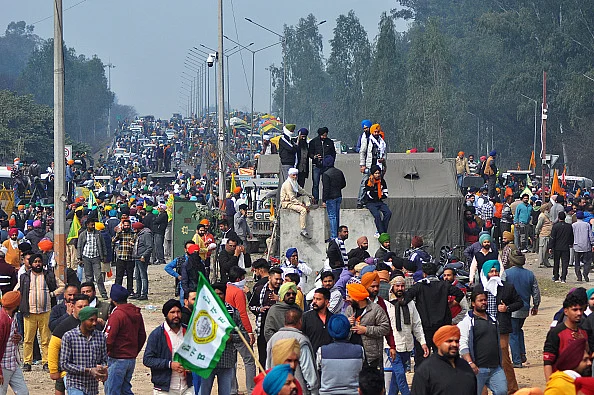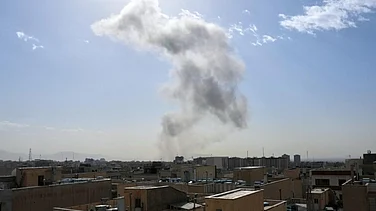As the farmers' protests revived again, on February 13, specific locations around Delhi's borders were fortified and blocked in an attempt to prevent a repeat of the 2020-21 farmers' protests. This decision came after inconclusive talks between farmer groups and Union ministers during the concluding session on Monday night.
This protest demands the implementation of the Swaminathan Commission's report, a total remission of farmers' debts, a legal guarantee for the Minimum Support Price (MSP) on all the major crops, pension provisions for farmers, and the removal of farmer-related cases from the 2020 protest.
Nonetheless, surprisingly, the increase in farmer demonstrations is not only limited to third-world nations and developing nations like India. Recently, farmers’ movements have broken out across Europe for a variety of causes. These include demands for improved compensation and protection against foreign competition in France, the phasing-out of a tax break on agricultural diesel in Germany, and challenges to EU environmental regulations in several other nations.
Germany: Nationwide Protests Against Subsidy Cuts
In Germany, farmers initiated nationwide protests on January 8 this year, protesting against subsidy cuts. The government's decision to phase out a tax break on agricultural diesel fueled the demonstrations, as farmers fear it may lead to bankruptcy. With the next sitting of the Bundesrat scheduled for March 22, a resolution to the feud between the government and farmers may take a few more months.
Italy: Protest Against Agriculture Sector Support Cuts
In Italy, farmers staged a convoy in Rome to protest the reduction of support for the agriculture sector, aligning their concerns with those of farmers across Europe. Protests continue in various regions, reflecting dissatisfaction with agricultural policies at both national and EU levels.
Greece: Blockades for Climate Change and Energy Assistance
Greek farmers have set up blockades in central and northern Greece, seeking government assistance to cope with higher energy prices and the growing impact of climate change. While the government promised help with energy costs and tax rebates, farmers escalated their protests, dumping chestnuts and apples outside an agricultural fair on February 3.
Belgium: High Taxes and Sustainable Agriculture Opposition
Hundreds of Belgian farmers, protesting high taxes and increasing costs, entered Brussels to demonstrate in front of the European Parliament. The protests are also a response to EU measures aimed at making agriculture more sustainable and the lifting of quotas on grain exports from Ukraine. Blockades persist, with farmers targeting key locations, causing disruptions, such as the one reported in Antwerp on February 13.
Spain: Nationwide Protests against Excessive Taxes
Spanish farmers began nationwide protests on February 6, focusing on issues such as environmental rules imposed by the EU, excessive taxes, and bureaucratic red tape. The protests turned violent on February 10 in Madrid, where clashes with the police occurred as farmers and truck drivers sought to block main roads. Farmers plan to continue their street protests throughout February.
Lithuania: Dissatisfaction with Agricultural Policies
Lithuanian farmers, dissatisfied with agricultural policies, staged a two-day protest in the capital, Vilnius, on January 23. Their demands included stopping the transit of Russian grain through Lithuania and finding a solution to the issue of grasslands. Permit extensions for the protest site were not granted, and farmers met with the prime minister on January 25.
France: Unrest Amid Concessions
In France, the discontent among farmers manifested in extensive protests that saw tractors blocking highways near Paris and throughout the country. Dissatisfied with the concessions offered by President Emmanuel Macron's government, French farmers called for improved pay and protection from foreign competition. The protests escalated to the point where over 90 farmers were taken into custody as they demonstrated outside a food market in Paris on January 31. The French government responded by offering over 400 million euros in measures addressing concerns over low earnings, heavy regulation, and unfair competition. As of February 2, the roadblocks around Paris and other areas have been gradually lifted.
Romania: Resolution Amid Protests Against Business Costs
In Romania, farmers protested against low prices for produce, rising costs, imports of cheap foodstuffs, and constraints imposed by the EU's climate change initiatives. The coalition government reached an agreement with farmers on February 2, ending weeks of protests against high business costs.
Poland: General Strike Against EU’s Environmental Policies
Farmers in Poland have been blocking roads across the country, protesting EU environmental policies and unfair competition from non-EU nations. The month-long general strike, initiated on February 12, seeks measures from both the national government and the EU to address production cost hikes, reduced profits, and unfair competition.
The furious farmers' movement is not limited to India and Europe. In April 2022, thousands of Argentine farmers rallied in Buenos Aires against President Alberto Fernandez, whose attempts to control food prices to counter severe inflation have been criticised by the agricultural industry.
In November 2022, Peruvian farmers and truck drivers mounted at least 14 roadblocks as part of continuous demonstrations about high petrol prices and fertiliser shortages, causing disruptions in the South American country's trade and tourist industries.
However, it looks like governments across the world frequently pursue agricultural policies and reforms intending to modernise the industry and increase output. However, implementing such reforms without regard for farmers' concerns and needs might cause instability.
The most common problems across the nation include subsidy reductions, changes in land-use laws, and the implementation of market-oriented policies. Farmers claim that these regulations disproportionately benefit corporate interests, jeopardizing traditional agricultural techniques and harming their livelihoods.
The global surge in farmers' protests reflects a shared struggle against common challenges faced by agricultural communities. From economic pressures and agricultural policy concerns to environmental issues and disparities in access to resources, farmers worldwide are voicing their grievances.



























